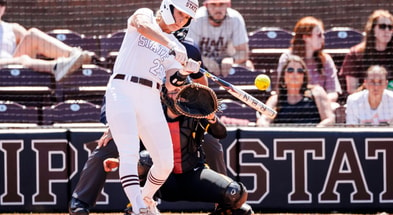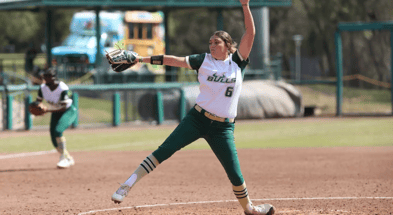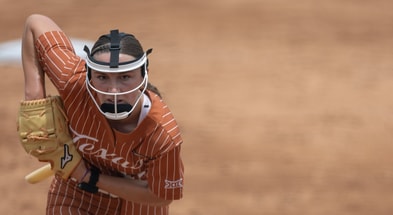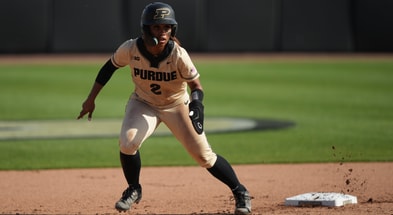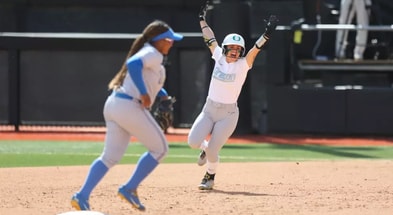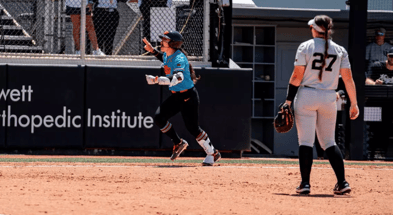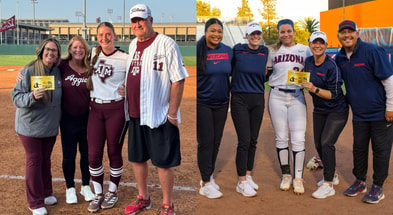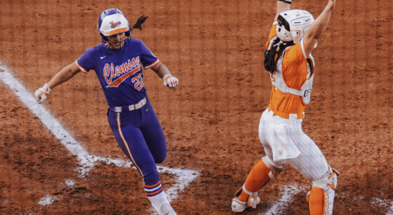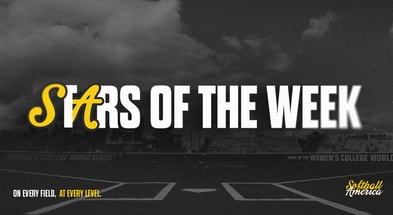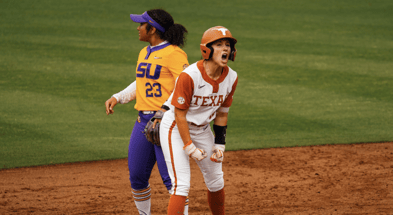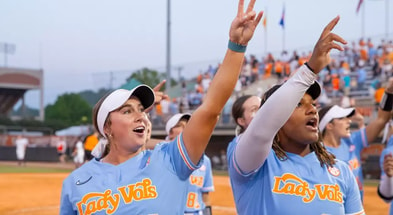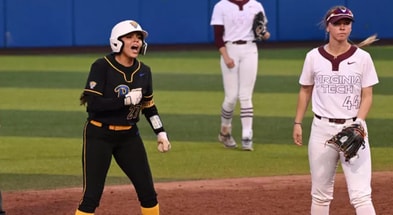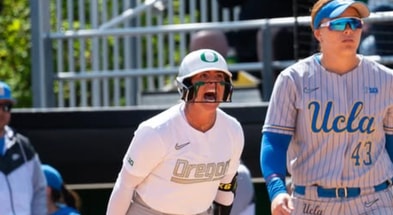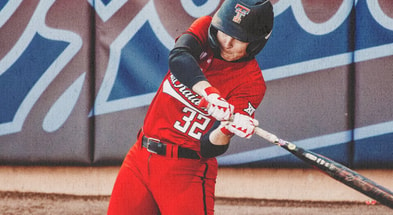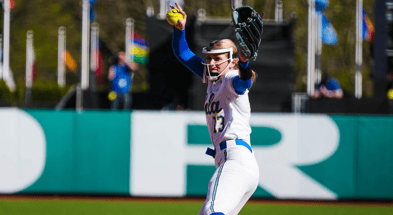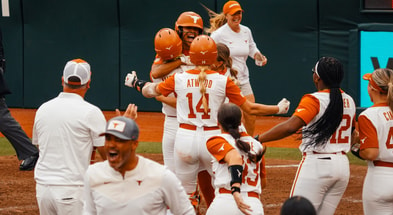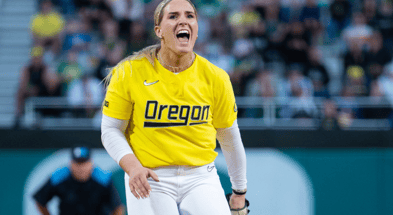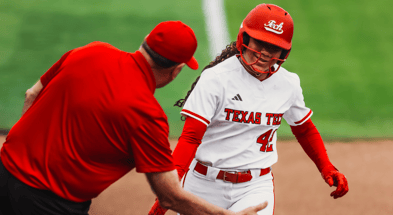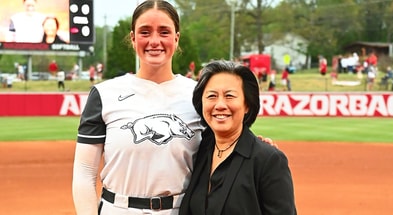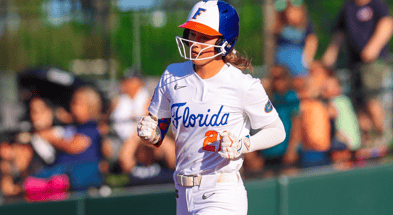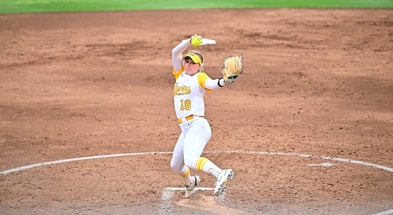Morgan Zerkle's Journey from Small Town Underdog to Softball Pro
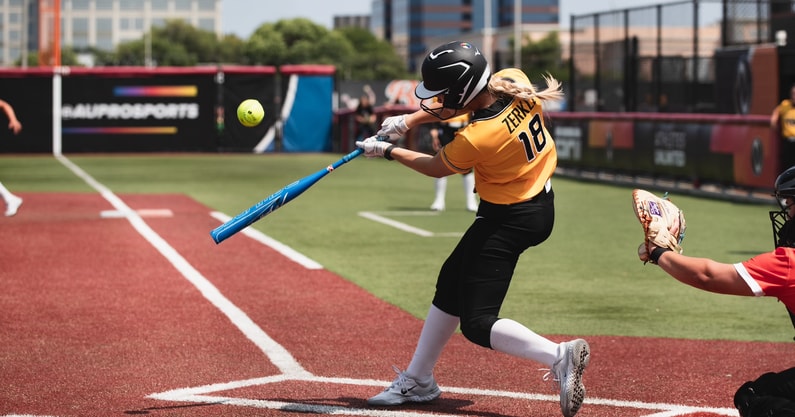
This story was written by Savanna Collins as part of the partnership between Softball America and Athletes Unlimited.
When you leave Marshall University, a few turns get you onto US Route 60, or the Midland Trail. From there, about a 25-minute drive east will take you to Milton, West Virginia where Morgan Zerkle grew up.
A town of just under 3,000, it’s the starting point of Zerkle’s softball career. Playing rec ball and then for the Mountain Thunder, a summer travel ball organization that started — and ended — with her and eleven or so teammates who played together growing up.
Zerkle was a small, quick, and gritty third baseman. In high school, she learned to slap hit and switched to solely hitting from the left side.
“I was really small then, so I wasn’t super recruitable as a tiny right-handed hitter,” Zerkle said.
Zerkle didn’t know at the time her mantra of “figure it out” was already starting to come to life in her softball career.
ADAPT
Marshall Softball head coach Shonda Stanton saw the speed and power potential in the Cabell Midland High School infielder. Marshall was the only school to recruit Zerkle and signed her to compete with the Thundering Herd. She grew up wearing the green and white at football and basketball games, and attended sports clinics as a kid, but things were different when she stepped onto the campus as a freshman athlete in 2014.
“Going into college, it was the first time I really had a specific softball coach who wasn’t just a dad,” Zerkle explained. “I really didn’t have a ton of coaches. I never took a single lesson growing up, and I never paid for someone to teach me how to hit or slap or do anything. It was all just local parents who had taught my team.”
Now it was scrutinized skills training, drills, placement hitting, scouting, and technique. Zerkle had previously relied on her athleticism but at the next level, that wouldn’t be enough.
“I cried a lot as a freshman,” Zerkle remembers. “Mainly I’d never dealt with so much failure in my life or being told, ‘Hey, you can’t just get by with making contact, you have to do it this certain way and if you want to hit elite pitching, you have to do it this certain way.’ I had a lot of tears freshman year trying to figure out how to hold myself to a higher standard, be coachable, and adjust to a higher level of softball.”
The sole coach who recruited her was right about Zerkle; she had what it takes to adapt.
UNDERDOG
Zerkle collected some of the highest honors in softball throughout her collegiate career after defying the odds of a small town and travel ball team no one had heard of. But at the 2017 National Pro Fastpitch Draft, she was right back to being the underdog. Zerkle was the No. 26 pick — the final pick — of the draft, chosen by the Scrap Yard Dawgs.
She wasn’t joining the pro league with a Power Five pedigree. The stigma around midmajor softball athletes was still prevalent.
“I always felt like I constantly had to prove myself, whereas other people kind of just had the respect because of where they came from and I felt like I’ve always had to work extra hard to prove myself or earn that respect.”
She was ready to take on the next learning curve, facing elite pitchers and the politics of maintaining a spot on the ever-dwindling rosters in pro softball.
Zerkle played three seasons in the NPF and competed internationally with Team USA. She joined Athletes Unlimited in 2020 for the inaugural season and has played 82 games in the AU Pro Softball Championship and AUX seasons, more than any other athlete in league history.
The name Morgan Zerkle is scattered across the league record books. When looking at AUX and Championship season career leaders, Zerkle is fourth in batting average (.347), third in runs (58), third in hits (91), and second in stolen bases (19).
Zerkle earned a spot on the 2014 Conference USA All-Freshman Team and the NFCA Mideast All-Region Second Team. In her sophomore year, she won the Golden Shoe Award for leading the nation in stolen bases, was second in the NCAA in batting average (.506), and tied for fourth in hits (89). Zerkle went on to become an All-American, Conference Player of the Year, two-time Marshall Athlete of the Year, and two-time USA Softball Collegiate Player of the Year Finalist.
“Coming into college I knew I was good, but I didn’t know what ceiling I could have if I learned a lot more things. [Coach Stanton] didn’t let me get by just being the best athletically, she made me refine my skills as well.”
“I think one thing that you have to do to be successful in the pro world is be accountable with yourself – it’s on you to work out to stay in shape, to stay hitting, to stay ready when your season is short. You have all year round, you’re by yourself training,” Zerkle said.
This was something Zerkle had long ago figured out. Growing up in a small town without lessons, trainers, and coaches didn’t just make her an underdog, it made her independent.
“I had to teach myself and learn myself at an older, smarter time in my life,” Zerkle said.
She explained how sometimes at a young age, players who are coached and find excellence and recognition within softball early may not know what makes them good. She gave the example of elite athletes who are great but don’t know why.
“I didn’t just wake up great. It took me a long time to get to the level I am now, and I think that helps me coach other people that aren’t maybe the level they want to be at because I’ve been there in their shoes and I had to really work for it and continue to work for it even after I graduated. Yeah, I’ve been in the pro league eight years now, but my first pro season looked a lot different than it has the past couple of years.”
The proof is in the numbers. In a league with seasons as short as two weeks and no longer than five, Zerkle rarely struggles in slumps at AU Pro Softball. She is second in all-time leaderboard points with 7,646 finishing in the top six three different times and the top half of all athletes every season she’s played with AU Pro Softball except for one.
Of the 26 athletes in Zerkle’s NPF draft class, only six continue to play pro professionally today. She’s one of the few who has found longevity and prominence in her career.
COACH
While she continued to hone her craft as an athlete, Zerkle pursued coaching. She served as a graduate assistant at Indiana, reconnecting with former Marshall head coach Shonda Stanton. She spent four seasons at Miami University as an assistant.
Now when Zerkle pulls into Marshall’s Dot Hicks Field, it’s not as a young fan or an athlete. It’s as the head coach. In June she was chosen as the fifth head coach in the softball program’s history.
She will also compete in the 2024 AUX and Championship season.
“I think if I were to give it up, I would be sending my student-athletes the wrong message; I want them to know that they can chase their dreams,” Zerkle said. “I still fail and strike out and do all the things and I can relate to you because I still do that at a high level.”
No one can relate to their players quite like Zerkle and the coaching staff she’s assembled. On her staff are current AU athlete Sydney McKinney, former AU athlete Aly Harrell, and Allison Rager who served as a facilitator during the 2023 season.
Her players see her as a confident and outspoken coach, leader, and professional player, “but it took me a long time to get to this state,” she said.
“I was not confident for a good period of time. I was shy and insecure and quiet and I had to really adapt myself to be the head coach that I am now,” Zerkle said.
“I think some people just see how I am and think that’s just who I was naturally, but it’s not. I definitely had to work on myself in a lot of areas to be the person I am now, and I wish they knew that so they could also believe in their own ability to improve in areas.”
If you look up Morgan Zerkle’s bio on the pro teams she played for, the basics can lead you down the winding (country) roads of her career.
Milton, West Virginia: The small town and state she’d travel all over playing softball.
L/R: Bats left, throws right speaks to when she adjusted at a young age to make her a tough out at the plate.
Marshall University: The only school that recruited her but found one of their best players in program history.
Figure it out: Her motto and a simple summation of it all.
“I did not come out of high school great. I didn’t come out of college great. But I continue to grow in my game and I think that’s why I’m still here now.”
Savanna Collins is the Senior Reporter at Athletes Unlimited. You can follow her on Twitter @savannaecollins.
